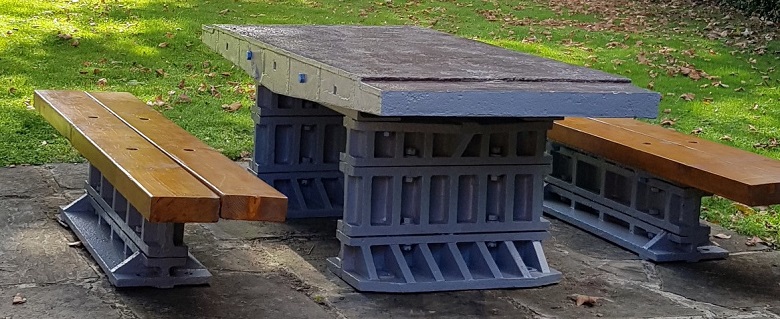Industrial works of art
Monday 23rd September 2019 12:00

Part of London’s industrial past has been preserved by Britain’s biggest water company after being upcycled into a unique picnic table and benches weighing almost two tonnes.
The one-of-a-kind patio set has been unveiled in the grounds of historic Abbey Mills Pumping Station in East London and is made from items removed when Thames Water upgraded the Victorian sewers running through Waterworks Bridge in Stratford.
The table top was once one of several cast iron road plates forged at Blaenavon ironworks in south Wales around 170 years ago. It sits on two pedestal bearings while the benches are created from rocker bearings. The complete set weighs around 1.7 tonnes.
The project’s construction manager, John McKay, said: “When we started the works, we knew we were going to remove some very special pieces of engineering that were part of Sir Joseph Bazalgette’s quest to wipe out cholera in London by building an efficient sewer network.
“The beautiful forged-steel structures have been part of London’s history since Queen Victoria was on the throne, so the team wanted to make sure they could be appreciated by everyone as part of Thames Water’s history.
“Often they were constructed from intricate components that can only be described as works of art. They had served the Metropolitan Board of Works and Thames Water for over 175 years, so it would have been criminal to throw them in the skip."
Abbey Mills is a working site and therefore normally closed to the public, but people can take a tour during open days.
Thames Water completed the £11.4 million Waterworks Bridge scheme in July with the reopening of the bridge and a cycle route which had been closed since work started on regenerating the area for the Olympics over 10 years ago.
For the first time on a cycle lane in the UK, a special ‘waste plastic asphalt’ was used which is far more sustainable. Part of the bitumen normally used was replaced with the equivalent of 1.1 million plastic bags which would have otherwise gone to landfill. The new cycle lane forms part of a new five-mile Quietway route, connecting St Marks Gate to Cycle Superhighway Three at Newham Way.
